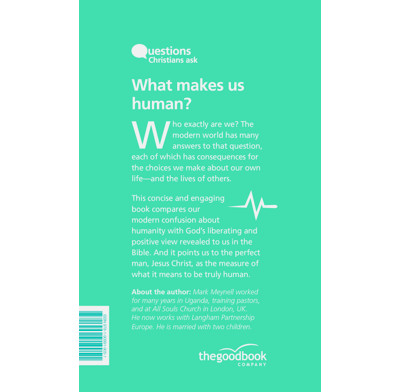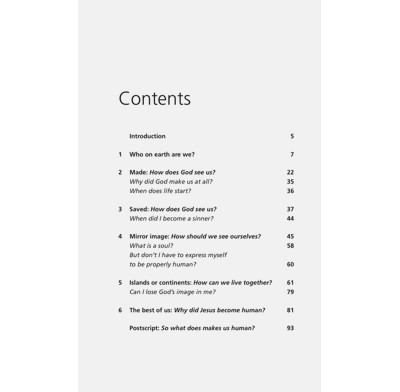


An engaging and accessible guide to the Bible's teaching on who we are.
Part of the Questions Christians Ask series.
What exactly are we? The modern world has many answers to that question, each of which has consequences for the choices we make about our own life and the lives of others.
In this short, accessible book, Mark Meynell wants to help confused Christians understand what God has said in the scriptures about key questions, such as when does life begin, where do our souls come from, and what sets humans apart?
He offers a positive and liberating way forward as we discover what true humanity really is.
Introduction
1. Who are we: Animal, Vegetable or Mineral?
2. God-Sense: Looking beyond ourselves
3. Me, Myself and I: Looking within ourselves
4. Between Rocks and Relationships: Looking outside ourselves
5. The True Man: Looking at Jesus
Conclusion
| Contributors | Mark Meynell |
|---|---|
| ISBN | 9781909919068 |
| Format | eBook |
| First published | July 2015 |
| Language | English |
| Publisher | The Good Book Company |
This 80 page book really explains why we are different to animals and angels. He shows that to understand your humanity you have to look to the creator. All very clearly explained and yet thought provoking.
Despite coming in just shy of 100 pages, I was surprised by how much there is in this book and how significant the subject matter is. In summary for me, it describes our identity and innate character by showing us God’s. From this, the author considers how God sees us and how we should see ourselves as a result.
The book opens with a swift, relevant look at how society has tried to classify our race. Ultimately these classifications are shown to be short of the mark, reducing humanity down to something that is not more than our parts. The world views they set up don’t capture the essence of what it is to be human (for better and for worse), to have a conscience, emotions and a soul. And ultimately the author begins to consider a bigger world view, from the God who created them.
It’s an engaging read as the author opens up this world view. With lots of quotes and references from other writers (which admittedly was almost too much in some places) I think it succeeds in shining light on ourselves, our character, triumphs and flaws and showing us how interdependent on each other we are.
The author does well to show the spiritual side of our nature too, and ultimately succeeds, while being faithful to what the Bible teaches, in showing the importance of Jesus in understanding how we can know the creator God.
There will be lots of reflections, pauses and questions that will be naturally raised when reading this. And in 100-odd pages, such questions can’t be fully discussed, but this feels like it stays true to its condensed purpose.
I was left with a greater fascination of how as humans we were created to be in God’s image. And as a result a greater fascination in God’s plan for us all.
I’d recommend this book to anyone who loves to get into big questions without reading a tome of philosophical material. For new Christians it will be enlightening and certainly raise other questions to ponder. As an older Christian myself, it’s a great and swift read.
Note: I received a free copy of this book from the publisher in exchange for a fair review.
The latest in the Questions Christians Ask series, Mark Meynell sketches out a solid introduction to basic Christian beliefs about humanity. Its brevity is both it's biggest strength and weakness. It is accessible and easily digested in an hour or two. It's probably most helpful for younger or newer Christians - more established Christians might find it a bit basic, and it assumes a lot that a non-Christian might want to argue.
It's weakness is that the Questions Christians Ask format works best with a clear and specific question, but "what makes us human?" is a massive and broad topic. It touches on big questions such as gender and sanctity of life without room to develop its implications. Some suggestions for further reading might have helped, especially since a book of this length can't be much more than an introduction to larger topics.
But given the limitations of tackling such a big question in such a short read, if you're looking for a pithy summary of the Bible's teaching on what it means to be human, this is a good and helpful book.